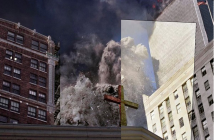Earlier this week, I posted 2 items about the arts policies of Boston's 4 mayoral candidates. I also sent questions to the candidates and promised post them here. Tonight, Michael Flaherty's campaign sent a long response which I'll include in it's entirety below.
As I noted in my original posts, Flaherty is the only candidate to have an arts policy stated as part of his platform, while Thomas Menino stands on his record and Sam Yoon has outlined some proposals.
Here are the answers from Jordan Weissberg of Michael Flaherty's campaign to some of my questions regarding their arts policies:
Q: Both President Obama and Governor Patrick have identified the creative economy as an important and growing sector on both the local and national level. Does your candidate support the growth of the creative economy, and would they use the position of Mayor of Boston to change current policies regarding the local creative economy? If your candidate supports growing the creative economy: what, specifically would this include (tax breaks for alternative gallery or performance spaces, assistance to bring buildings up to code, promotion of the arts, etc). If your candidate does not support growing the creative economy: why not?
A:Boston's ability to recover and grow its economy requires bold, holistic and outside-the-box thinking. Currently, our commitment to growing our arts sector and supporting its local artists and small arts-related businesses is inferior to other cities such as Providence and Pawtucket, Rhode Island, as well as Paducah Kentucky. Each year we are losing our local artists and members of our commercial gallery sector to these other cities who have used their talents and contributions to completely revitalize their neighborhoods and refuel their local economies. The fact that we have lost nearly ten galleries and our only midsize dance company underscores that we have not created an environment that fosters the growth of this critical sector. Even when we hosted the 2007 and 2009 Conference on International Opportunities in Arts and participants traveled from all over the world to serve as presenters and visitors of Boston, the Mayor failed to attend. This conference - the only one of its kind in the U.S. - has consistently been a key missed opportunity for our city, and specifically our Mayor, to personally welcome these participants, showcase the city's cultural assets, and participate in much needed conversations about how Boston - and its international partners - must better support its artists and grow its creative economy.
For us to truly harness the full potential of the creative economy, we must empower the very individuals that drive the creative economy - the artists and workers. That's why during the first week of August, I unveiled a ten-point plan to stimulate the city's creative economy. My plan focuses heavily on supporting individual artists and small arts-related business owners. The plan includes innovative strategies to provide affordable live/work space to artists, the creation of a cabinet level position for culture, free workshops and seminars for individual artists, workers and owners in need of assistance of understanding the city's codes and permitting processes, engaging local colleges and universities, and the establishment of a one percent for public art ordinance which would require one percent of construction costs for city-funded development projects to be set aside to support integrated public art works throughout the city. For more specific details on my plan, you can read my white paper on my website, http://michaelflaherty.com/?l=issues
Q: Michael Flaherty is currently the only candidate to have an arts policy as part of his platform & Mr. Flaherty has a reputation for working with arts organizations. How would he continue these relationships as Mayor? What, specifically, would he enact as Mayor that would change, expand/diminish or improve upon the current policies relating to the creative economy? Where does he see potential for growth that is currently untapped?
A:While the city currently has the Office of Arts, Tourism and Special Events, this office - because of its overly broad scope - has not adequately served and grown the artistic communities in the way we must. As a way to refocus our efforts and empower mayoral staff to grow the city's creative presence, my administration will reorganize the city's structure to create a top level position who will directly oversee, coordinate and facilitate all city programs exclusively relevant to the promotion of the city's artistic community. This person will work directly with individual artists of all disciplines, as well as small arts-related businesses, cultural/artists entrepreneurs, small and large arts nonprofits, tourism and cultural-related businesses, cultural educational programs both within the city's schools and the colleges and universities.
By working with myself and other cabinet members, this position will ensure efficient collaboration among the city's departments, maximizing all opportunities to foster the city's cultural and creative economies. Each department will play a role in executing my creative economy roadmap, which will be ultimately spearheaded and managed by this cabinet level position. A critical component of this plan will be to develop strategies to ensure that gentrification does not push artists out of their neighborhoods. This person will also broker partnership opportunities with other cities across the state, as well as across the country to mobilize the creative sector on a local, state, national and international level.
The city's new cabinet position for culture will then hire a staff person who will work directly with individual artists to improve city services for individual artists, art students and artist-run businesses and organizations. This Director of Artists Services will facilitate monthly public meetings where s/he will engage artists and owners in conversations about the city's creative sector. These meetings will serve as opportunities for artists, cultural workers and owners to network, participate in panel discussions and contribute ideas to an artists newsletter that will be overseen by the Director position.
At the same time, my administration will take proactive steps to bolster the city's support of not-for-profit and for-profit arts-related business owner. Compared to digital media and video game industry, which the Menino administration has made a central focus of their arts platform, the commercial gallery sector, other for profit arts related businesses, and small nonprofit arts organizations have been overlooked. However, they need our help and support too, especially when so many of their owners are personally bankrupting themselves as they teeter on the verge of closure. That's why my administration will offer services to not-for-profit and for-profit arts-related business owners that will include assistance understanding the city's codes and negotiating a permit, which is valuable knowledge to have when planning a special event, as done frequently by the arts community. The city will also provide free seminars to inform owners about opportunities for no-interest loans and bridge money to help fill critical funding gaps during challenging fiscal times. Through effective educational outreach efforts that help owners put their businesses on stronger financial ground, the city will strengthen its commitment to grow the creative economy and simultaneously help create more job opportunities for artists and cultural workers.
In addition, the city will capitalize on the latest technologies to create a web component that allows artists to register their discipline with the city, as well as any concerns or comments for improving the city's resources and programs for artists and cultural workers. Only through this online program and regular interface with the artists and business owners will the city be truly able to understand the scope, make-up and needs of our creative community. The data generated by the registry and contact with the individual artists will allow city officials to see which areas are thriving and which need additional support.
To ensure that the valuable contributions of our artist community is properly acknowledged and celebrated, my administration will sponsor an annual event at City Hall. The event will include the participation of the myself, each City Councilor, and relevant administration staff which will allow artists, artists run organizations, and artists who are small business owners to familiarize themselves with the city officials they need to work with to support and grow their presence in Boston. Equally as important, the event's roundtable discussions and advocacy sessions will raise the profile of the city's cultural community and serve as an opportunity for the artist community to educate the city on their contributions, interests and needs.
As always, Big RED & Shiny does not endorse or support any candidate, and we encourage all voters to consider may facets when choosing an elected official, among them the candidates arts policies.


